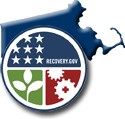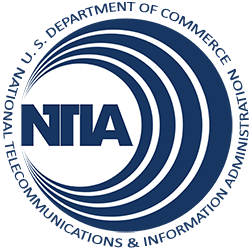The Cambridge Housing Authority Community Computer Centers project plans to reopen and expand three public computer centers that serve approximately 10,000 public housing residents, including low-income households, immigrants, seniors, and minorities. The Cambridge Housing Authority intends to replace 24 workstations and add 16 new ones at the centers to serve an expected 420 new users per week with access to broadband technology, computer courses, job training, and literacy programs.
Massachusetts

| Grantee | Total Award | Type |
|---|---|---|
| Cambridge Housing Authority | $698,924 | Public Computer Centers |
| City of Boston | $1,906,439 | Public Computer Centers |
| City of Boston | $4,312,476 | Sustainable Adoption |
| Communication Service for the Deaf, Inc. | $14,988,657 | Sustainable Adoption |
| Massachusetts Broadband Institute | $6,162,554 | Broadband Data & Development |
| Massachusetts Technology Park | $45,445,444 | Infrastructure |
| One Economy Corporation | $28,519,482 | Sustainable Adoption |
| OpenCape Corporation | $32,072,093 | Infrastructure |
| OSHEAN Inc. | $21,739,183 | Infrastructure |
| University Corporation for Advanced Internet Development | $62,540,162 | Infrastructure |
| University of Massachusetts–Lowell | $783,094 | Sustainable Adoption |
The Boston Public Computing Centers project, a partnership between the City of Boston’s Management and Information Services Department, Boston Public Library, Boston Centers for Youth and Family, and the Boston Housing Authority, proposes to expand computer and Internet capacity at the city’s main library and 25 branches, 16 community centers, and 11 public housing sites. A majority of project sites are expected to be in the city’s lowest income areas, and plan to offer before- and after-school, job readiness, enrichment, workforce development, and alternative education programs. The project intends to provide computer access and training for students, seniors, limited-English speaking residents, and people with disabilities with 379 workstations and laptops. An estimated 18,700 people will be served per week at the 53 public computer centers.
The City of Boston’s Department of Information Technology proposes a partnership with city nonprofit foundations and agencies to increase broadband adoption in low-income areas. The project proposes to focus on public middle and high school students and their families, senior housing residents, and the unemployed by making subsidized computer equipment and training available to increase broadband adoption. The project intends to implement three broadband-adoption programs: (1) Technology Goes Home, a school-based family computer distribution and education program that will provide 15 hours of digital literacy training to students and their families across 52 public middle and high schools; (2) Connected Living, a computer education program tailored toward seniors living in public housing developments including specialized content, group classes, and peer training; (3) Online Learning Readiness, an intensive 12-week, 240-hour digital workforce skills training program for unemployed residents.
Broadband’s ability to expand educational and employment opportunities is especially meaningful for Americans who are deaf or hard of hearing, a community that faces unique challenges in education and that suffers from a rate of unemployment much higher than the national average. Communication Service for the Deaf, Inc. (CSD) intends to expand broadband adoption among people who are deaf and hard of hearing and provide them with online tools to more fully participate in the digital economy. The project proposes to employ a combination of discounted broadband service and specialized computers, technology training from an online state-of-the art support center customized to the community’s needs, public access to videophones at anchor institutions from coast to coast, and a nationwide outreach initiative. Thousands will gain online access to all the Internet has to offer, including sign language interpreters, captioned video services, and other content and functionalities designed especially to advance their educational, employment, and healthcare interests.
Project Components
Application Usage and Development:
In partnership with the Red Sox Foundation and the Massachusetts General Hospital and others, the Massachusetts Broadband Institute (MBI) will create a Gov 2.0 portal for veterans and their families to fully access the services, information, and opportunities available to them in the state of Massachusetts. This portal will serve as a model for future government websites by creating a single interface which constituents can use to access the services of multiple agencies.
Computer Ownership and Internet Usage:
In partnership with the Massachusetts Office of Small Business and Entrepreneurship, MBI will make competitive sub-grants of $60,000 over a three year period to four community development corporations (CDCs) in economically depressed areas of Massachusetts. These CDCs will recruit small businesses and non-profit organizations, all with annual budgets that are less than $500,000, to participate in a technical assistance program, providing approximately 40 organizations with technical assistance training over the three-year life of the project. The technical assistance recipients will develop a staff and technology plan and receive specialized training, such as how to implement a technology curriculum in their programs or how to ensure data security. Technical assistance participants will also have the opportunity to receive a competitive subgrant to implement portions of their strategic technology plans. MBI will also subcontract with an independent evaluator to assess the project’s outcomes over the period of performance.
Data Collection, Integration, and Validation:
This project was originally funded for broadband planning activities and two years of data collection. In September of 2010, this project was amended to extend data collection activities for an additional three years and to identify and implement best practices.
Address File Development:
MBI is proposing two innovative and cost-effective solutions to create address point files to improve geocoding accuracy: 1) Focusing on 45 towns and census blocks greater than two square miles, MBI will utilize existing digital parcel data and real estate files to automate the creation of accurate address files; 2) MBI will implement a proof-of-concept model for crowd sourcing addresses across 35-45 towns, and will expand the work to all towns in the state after reviewing the effectiveness of the crowd sourced mechanism.
With the goal of bringing affordable, high-speed Internet access to western Massachusetts and connecting the region to the rest of the state’s digital economy, MassBroadband 123 plans to link almost 1,400 community anchor institutions through a new middle mile fiber network. By constructing over 1,300 miles of new fiber in areas such as the Pioneer Valley and mountainous Appalachian regions where connection costs are frequently two or three times as high as in the eastern part of the state, this project intends to provide1.5 Mbps-10 Gbps high speed service to public safety entities, K-12 schools and community colleges, local and state government facilities, and dozens of healthcare providers in economically distressed areas across western Massachusetts.
The 21st Century Information and Support Ecosystem project proposes to implement a comprehensive program of computer training, wireless Internet access, broadband awareness marketing, and online content and applications to residents of 159 affordable and public housing developments and low-income communities in 50 cities and towns across 31 states and the District of Columbia. The project plans to implement four principal programs: training 2,500 youth to become “Digital Connectors” who will then provide digital literacy training to others in their communities; deploying localized broadband networks in public housing developments; developing online content and applications aimed at low-income, low-literacy audiences.
The OpenCape Corporation Middle Mile Project intends to deploy 350 miles of fiber-optic and microwave broadband network to directly connect more than 70 anchor institutions, including 12 emergency shelters, 30 libraries, five colleges, six academic research facilities, and 18 town or public safety facilities. These anchors will receive 100 Mbps service, allowing them to support a wide range of economic, educational, public safety and healthcare-related applications. The project also expects to facilitate new or improved high-speed Internet access for the entire Cape Cod region, comprised of approximately 320,000 households, 62,000 businesses, and 520 anchor institutions, by enabling local Internet providers to connect to the project’s open network.
Rhode Island’s Ocean State Higher Education Economic Development Administration Network (OSHEAN) is proposing a new fiber-optic backbone network to connect community anchor institutions and offer interconnection points for local broadband providers in all five counties in the state, as well as Bristol and Plymouth Counties in southeastern Massachusetts. The BEACON 2.0 network proposes service speeds between 1 Gbps and 10 Gbps to community-serving-institutions to enable higher education, research, remote healthcare, and many kinds of economic development and job training applications. The network would serve 14 university and community college locations, including the Community College of Rhode Island, New England Institute of Technology, University of Rhode Island, and the Naval War College. The project also plans extensive engagement with public safety entities, including the Rhode Island State Police and the Narragansett Indian Tribal Police, to enable rapid data and video transfer.
As part of a longstanding project to connect essential community anchor institutions across the country, and facilitate closer collaboration and long-term benefits for education, research, healthcare, public safety, and government services, the University Corporation for Advanced Internet Development (UCAID) proposes a comprehensive 50-state network benefitting approximately 121,000 community anchors. The project proposes a large-scale, public-private partnership to interconnect more than 30 existing research and education networks, creating a dedicated 100-200 Gbps nationwide fiber backbone with 3.2 terabits per second (TBps) total capacity that would enable advanced networking features such as IPv6 and video multicasting. The project plans to connect community anchors across all disciplines into virtual communities with shared goals and objectives, including colleges, universities, libraries, major veterans and other health care facilities, and public safety entities, with additional benefits to tribes, vulnerable populations, and government entities.
The Lowell Internet, Networking and Knowledge project proposes to increase the adoption of broadband services by working with a diverse set of partners and using an inter-generational approach to bridging the digital divide. This initiative is designed to reach low-income and at-risk youth, the unemployed, residents without college degrees, and seniors. The project intends to build out 11 public computer centers to serve 6,650 new broadband users and add 7,500 additional broadband subscribers in the Lowell and Merrimack Valley, an area designated a “Renewal Community” by the U.S. Department of Housing and Urban Development. The technology training includes working with University of Massachusetts–Lowell students in computer centers to provide broadband-related training to vulnerable populations, including the nation’s second largest Cambodian community. The University’s Center for Family, Work and Community plans to measure the project’s impact by developing a survey tool for use at each outreach event, allowing comparisons of broadband awareness at the beginning and end of the project. Also, the University intends to work with Lowell’s broadband providers to obtain data on new subscribers.
